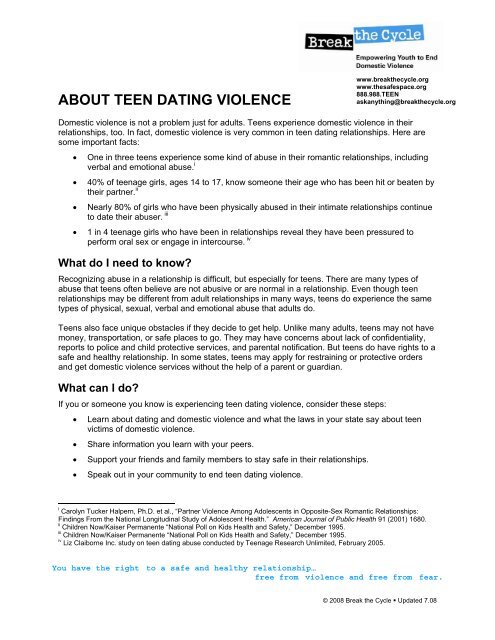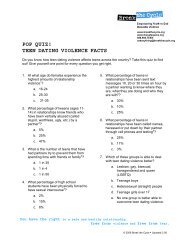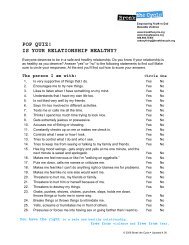ABOUT TEEN DATING VIOLENCE - Thesafespace.org
ABOUT TEEN DATING VIOLENCE - Thesafespace.org
ABOUT TEEN DATING VIOLENCE - Thesafespace.org
You also want an ePaper? Increase the reach of your titles
YUMPU automatically turns print PDFs into web optimized ePapers that Google loves.
<strong>ABOUT</strong> <strong>TEEN</strong> <strong>DATING</strong> <strong>VIOLENCE</strong><br />
www.breakthecycle.<strong>org</strong><br />
www.thesafespace.<strong>org</strong><br />
888.988.<strong>TEEN</strong><br />
askanything@breakthecycle.<strong>org</strong><br />
Domestic violence is not a problem just for adults. Teens experience domestic violence in their<br />
relationships, too. In fact, domestic violence is very common in teen dating relationships. Here are<br />
some important facts:<br />
• One in three teens experience some kind of abuse in their romantic relationships, including<br />
verbal and emotional abuse. i<br />
• 40% of teenage girls, ages 14 to 17, know someone their age who has been hit or beaten by<br />
their partner. ii<br />
• Nearly 80% of girls who have been physically abused in their intimate relationships continue<br />
to date their abuser. iii<br />
• 1 in 4 teenage girls who have been in relationships reveal they have been pressured to<br />
perform oral sex or engage in intercourse. iv<br />
What do I need to know?<br />
Recognizing abuse in a relationship is difficult, but especially for teens. There are many types of<br />
abuse that teens often believe are not abusive or are normal in a relationship. Even though teen<br />
relationships may be different from adult relationships in many ways, teens do experience the same<br />
types of physical, sexual, verbal and emotional abuse that adults do.<br />
Teens also face unique obstacles if they decide to get help. Unlike many adults, teens may not have<br />
money, transportation, or safe places to go. They may have concerns about lack of confidentiality,<br />
reports to police and child protective services, and parental notification. But teens do have rights to a<br />
safe and healthy relationship. In some states, teens may apply for restraining or protective orders<br />
and get domestic violence services without the help of a parent or guardian.<br />
What can I do?<br />
If you or someone you know is experiencing teen dating violence, consider these steps:<br />
• Learn about dating and domestic violence and what the laws in your state say about teen<br />
victims of domestic violence.<br />
• Share information you learn with your peers.<br />
• Support your friends and family members to stay safe in their relationships.<br />
• Speak out in your community to end teen dating violence.<br />
i Carolyn Tucker Halpern, Ph.D. et al., “Partner Violence Among Adolescents in Opposite-Sex Romantic Relationships:<br />
Findings From the National Longitudinal Study of Adolescent Health.” American Journal of Public Health 91 (2001) 1680.<br />
ii Children Now/Kaiser Permanente “National Poll on Kids Health and Safety,” December 1995.<br />
iii Children Now/Kaiser Permanente “National Poll on Kids Health and Safety,” December 1995.<br />
iv Liz Claiborne Inc. study on teen dating abuse conducted by Teenage Research Unlimited, February 2005.<br />
You have the right to a safe and healthy relationship…<br />
free from violence and free from fear.<br />
© 2008 Break the Cycle • Updated 7.08
You have the right to a safe and healthy relationship…<br />
free from violence and free from fear.<br />
© 2008 Break the Cycle • Updated 7.08




